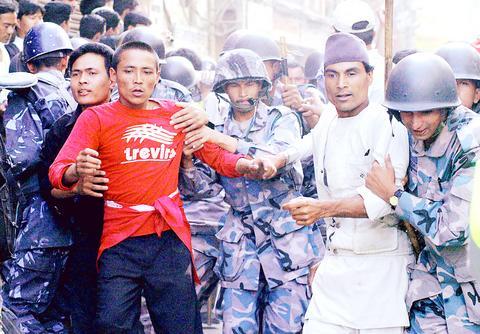With opposition to Nepal's monarchist government growing in intensity, more than 1,000 people were detained Friday in Katmandu, the capital, for violating a ban on public gatherings imposed this week. As many as 25,000 demonstrators defied the ban, according to news agency reports, capping a week of protests in favor of democracy.
Nepal has been embroiled in a civil war between Maoist rebels and the government that has left more than 9,500 dead, at least one-fourth of them since a ceasefire broke down at the end of August.
And it has been mired in a standoff between the five main opposition political parties and King Gyanendra that began when the king dismissed the elected prime minister and dissolved Parliament in October 2002.

PHOTO: EPA
Scheduled elections were postponed and efforts at rapprochement have failed.
Growing public frustration has led to the widespread expression of public sentiment against the king, who has historically been seen as a unifying force in Nepal. On April 4, the police injured more than 150 people when they used truncheons, rubber bullets and tear gas against protesters marching on the palace and chanting anti-monarchist slogans.
The king returned to Katmandu on Friday after a two-week tour of the country's western districts.
The Maoists, meanwhile, have stepped up their attacks on police posts and government centers in other areas of the country.
They have also been undertaking large-scale, if usually temporary, abductions of civilians to indoctrinate them.
Last weekend the Maoists also attacked Indian oil trucks after the Indian police arrested a senior Maoist leader in Kolkata, India.
The State Department warned American citizens this week against traveling to Nepal after two reports that American trekkers had been detained by the Maoists. The US is providing US$17 million in military aid to the government.

PARLIAMENT CHAOS: Police forcibly removed Brazilian Deputy Glauber Braga after he called the legislation part of a ‘coup offensive’ and occupied the speaker’s chair Brazil’s lower house of Congress early yesterday approved a bill that could slash former Brazilian president Jair Bolsonaro’s prison sentence for plotting a coup, after efforts by a lawmaker to disrupt the proceedings sparked chaos in parliament. Bolsonaro has been serving a 27-year term since last month after his conviction for a scheme to stop Brazilian President Luiz Inacio Lula da Silva from taking office after the 2022 election. Lawmakers had been discussing a bill that would significantly reduce sentences for several crimes, including attempting a coup d’etat — opening up the prospect that Bolsonaro, 70, could have his sentence cut to

China yesterday held a low-key memorial ceremony for the 1937 Nanjing Massacre, with Chinese President Xi Jinping (習近平) not attending, despite a diplomatic crisis between Beijing and Tokyo over Taiwan. Beijing has raged at Tokyo since Japanese Prime Minister Sanae Takaichi last month said that a hypothetical Chinese attack on Taiwan could trigger a military response from Japan. China and Japan have long sparred over their painful history. China consistently reminds its people of the 1937 Nanjing Massacre, in which it says Japanese troops killed 300,000 people in what was then its capital. A post-World War II Allied tribunal put the death toll

‘UNWAVERING ALLIANCE’: The US Department of State said that China’s actions during military drills with Russia were not conducive to regional peace and stability The US on Tuesday criticized China over alleged radar deployments against Japanese military aircraft during a training exercise last week, while Tokyo and Seoul yesterday scrambled jets after Chinese and Russian military aircraft conducted joint patrols near the two countries. The incidents came after Japanese Prime Minister Sanae Takaichi triggered a dispute with Beijing last month with her remarks on how Tokyo might react to a hypothetical Chinese attack on Taiwan. “China’s actions are not conducive to regional peace and stability,” a US Department of State spokesperson said late on Tuesday, referring to the radar incident. “The US-Japan alliance is stronger and more

FALLEN: The nine soldiers who were killed while carrying out combat and engineering tasks in Russia were given the title of Hero of the Democratic People’s Republic of Korea North Korean leader Kim Jong-un attended a welcoming ceremony for an army engineering unit that had returned home after carrying out duties in Russia, North Korean state media KCNA reported on Saturday. In a speech carried by KCNA, Kim praised officers and soldiers of the 528th Regiment of Engineers of the Korean People’s Army (KPA) for “heroic” conduct and “mass heroism” in fulfilling orders issued by the ruling Workers’ Party of Korea during a 120-day overseas deployment. Video footage released by North Korea showed uniformed soldiers disembarking from an aircraft, Kim hugging a soldier seated in a wheelchair, and soldiers and officials